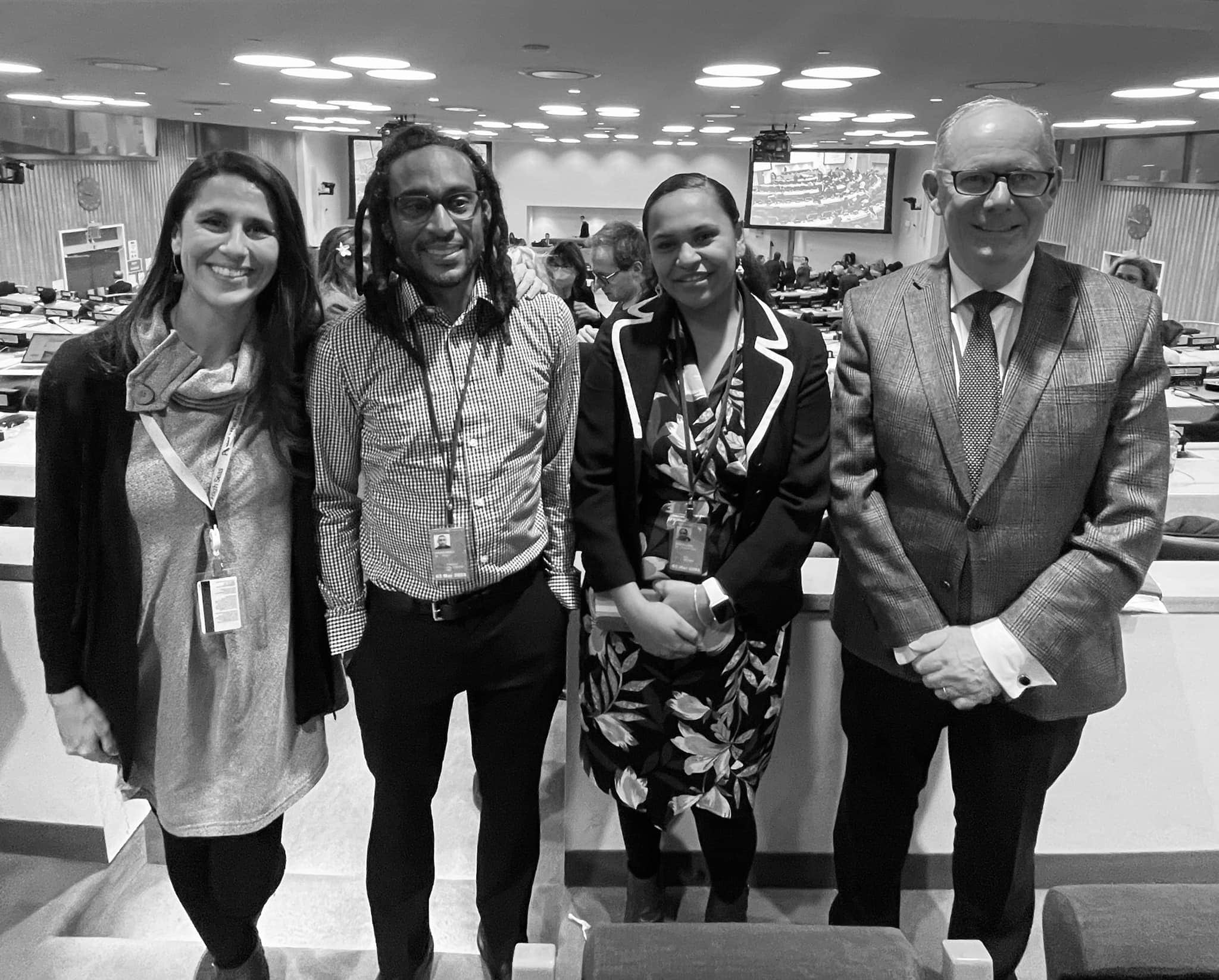
The World Maritime University (WMU) scholarly community is proud to have supported the negotiation of the agreed text of the Biodiversity Beyond National Jurisdiction (BBNJ) Agreement through various stages of the negotiation process at United Nations Headquarters (UNHQ) over the past six years. Once it comes into force, this landmark Agreement aims to ensure the conservation and sustainable use of biodiversity of areas beyond national jurisdiction, which account for over two thirds of the world’s oceans.
wmu PRESIDENT, dr. cleopatra doumbia-henry
"THE NEW AGREEMENT WILL HELP ADDRESS THE TRIPLE PLANETARY CRISIS"
In her capacity as President of WMU, Dr. Cleopatra Doumbia-Henry said that she is absolutely delighted with the outcome of the negotiations. According to its draft preamble, she points out that the new Agreement will help address the triple planetary crisis of biodiversity loss, climate change impacts on marine ecosystems, and pollution including plastic pollution, as well as ocean acidification and unsustainable use of ocean resources.
She wished to acknowledge the contribution of faculty, alumni, and students among those who negotiated and advised on the development of the agreed text of the Agreement. The World Maritime University (WMU) - Sasakawa Global Ocean Institute, under the leadership of Professor Ronán Long, played a significant role supporting the work of the Intergovernmental Conference since its establishment. This included hosting high profile conferences, seminars and workshops bringing scholars, policy makers and negotiators together at WMU to discuss key elements of the negotiations; publishing reports, books and other scholarly materials engaging with the ongoing negotiations; hosting and participating in side events at UNHQ; as well as by contributing expertise through the active participation of faculty, researchers and students in the whole negotiation process at the UN.
PROFESSOR Ronán LONG
"IT MARKS A MAJOR MILESTONE IN THE CODIFICATION AND FURTHER DEVELOPMENT OF THE LAW OF THE SEA"
Professor Long, who attended the final rounds of the negotiations as a member of the International Maritime Organization (IMO) delegation, noted the successful conclusion of the agreed text of the BBNJ Agreement under the brilliant leadership of H.E. Rena Lee from Singapore. This represented a major victory for multilateralism and the rule of international law at a precarious time for intergovernmental relations. As such, he believes that it marks a major milestone in the codification and further development of the Law of the Sea under the United Nations Convention on the Law of the Sea.
Advancing Ocean Conservation and Equity: Key Provisions of the New Treaty
Once it comes into force, the treaty will provide an international framework for employing area based management tools, including marine protected areas, to protect at least 30% of the world’s oceans by 2030. A central aspect of the Agreement is aimed at regulating environmental impact assessments at both project and strategic levels, offering possibilities to protect precious and fragile ecosystems from human activities.
The Agreement’s regulation of how marine genetic resources and digital sequence information from such areas may be used, and how their benefits will be shared among all states, represents a fundamental effort to achieve fair distribution of a new and potentially valuable resource. In doing so, it provides sophisticated rules and mechanisms for the sharing of monetary and non-monetary benefits.
These provisions are tied to building and developing the capacity of states parties, particularly developing states parties. Crucially, through its provisions on capacity-building and transfer of marine technology, the Agreement seeks to pursue fairer access for developing states’ to areas beyond national jurisdiction in order to participate in the management, conservation and sustainable use of these ocean areas and their resources.
From the perspective of WMU, Professor Long noted that the financial provisions and mechanisms are some of the most important aspects of the Agreement given the University’s proven success in undertaking capacity development for the IMO treaty regime over the past four decades.

WMU-Sasakawa Global Ocean Institute (GOI) negotiators- Dr. Mariamalia Rodríguez Chaves, Postdoctoral Scholar; Dr. Kahlil Hassanali (WMU alumnus 2022); Ms Alumita Talei Sekinaira (current MSc student specializing in Ocean Sustainability, Governance & Management); and Professor Ronan Long, Director of the GOI.
BBNJ Agreement: A Triumph of Multilateral Lawmaking and Global Ocean Governance
In welcoming these developments, President Doumbia-Henry said, “the draft text of the BBNJ Agreement recalls the effectiveness and bright promise of multilateral lawmaking, as well as the importance of the United Nations in norm setting for the international community. It signals the urgent necessity of capacity building to achieve fairer global participation in maritime and ocean governance, which is central to the academic mission of WMU. We look forward to supporting the international community with many of the tasks that need to be completed to ensure that the Agreement comes into force and is successfully implemented in due course.” She congratulated H.E. Ambassador Rena Lee from Singapore for her formidable leadership in bringing this critical and complex phase of the negotiations to a safe harbour, as well as for her commitment to supporting the work and scholarship of the WMU-Sasakawa Global Ocean Institute on the draft BBNJ Agreement. She firmly believes that there is a bright future ahead for the benefit of present and future generations of humankind thanks to the positive outcome of these marathon and complex negotiations.
Dr. Cleopatra Doumbia-Henry
(President of the World Maritime University)
about wmu-sasakawa global ocean institute
The vision of the WMU-Sasakawa Global Ocean Institute is to act as an independent focal point for the ocean science-policy-law-industry-society interface where policy makers, the scientific community, regulators, industry actors, academics, and representatives of civil society meet to discuss how best to manage and use ocean spaces and their resources in accordance with the United Nations 2030 Agenda for Sustainable Development. The Institute was inaugurated in May 2018 and made possible through generous support from The Nippon Foundation of Japan, the Governments of Sweden, Canada, and Germany, as well as the City of Malmö.
engagements and activities
Some of the WMU BBNJ related engagements and activities include:
On 7 February, WMU and the Ministry of Foreign Affairs of Japan hosted an International Workshop on BBNJ. The workshop brought together over 100 participants to address the topic of ‘Biodiversity Beyond National Jurisdiction (BBNJ): Toward Development of Balanced, Effective and Universal International Agreement’.
From 15-16 May, the 43rd Annual Center for Oceans Law and Policy (COLP) Conference took place at WMU. The event was co-sponsored by the Center for Oceans Law and Policy at the University of Virginia (UVA) School of Law, the WMU–Sasakawa Global Ocean Institute, and The Nippon Foundation. The conference focused on Biodiversity Beyond National Jurisdiction: Intractable Challenges & Potential Solutions.
On 30 August at the United Nations Headquarters, as part of the Third Session of the Intergovernmental Conference on an international legally binding instrument under the UNCLOS on the conservation and sustainable use of marine biological diversity of areas beyond national jurisdiction, Dr. Cleopatra Doumbia-Henry, WMU President, delivered a keynote address at the side event entitled ‘Capacity-Building, Gender Empowerment and the BBNJ Agreement.’ The event had a particular focus on the special needs of Small Island Developing States (SIDS), and how capacity building can help address the gender gap in ocean related industries.
On 12 May 2020, WMU released the BBNJ Workshop and the UNHQ Side Events Report. The former reviews the ‘‘Biodiversity Beyond National Jurisdiction (BBNJ): Towards the Development of a Balanced, Effective and Universal International Agreement” event that was held by WMU in February 2019 with the support of the Ministry of Foreign Affairs of Japan.
On 10 March 2021, WMU announced the new book on Biodiversity Beyond National Jurisdiction (BBNJ) being freely available online. The volume is jointly edited by Professor Myron Nordquist, Center for Oceans Law and Policy (COLP) at the University of Virginia and by Professor Ronan Long, Director of the WMU-Sasakawa Global Ocean Institute.
From 10-13 October, world leading experts on Maritime Law and Law of the Sea contributed to the IMO-WMU Joint International Academic Conference: Protecting the Ocean - Moving forward at 50: London Convention & Stockholm Declaration, hosted at WMU. The intent was to help raise awareness and discuss ocean- and climate-related topics under the framework of the London Convention and Stockholm Declaration's 50th anniversaries with the objective to achieve new research insights and establish impactful actions. As part of this conference, one panel addressed the Biodiversity Beyond National Jurisdiction (BBNJ) Agreement, with a keynote address from Ambassador Rena Lee, President of the BBNJ Conference and Ambassador for Oceans and Law of the Sea Issues and Special Envoy of the Minister of Foreign Affairs for Singapore.and contributions from lead negotiators of the process.
